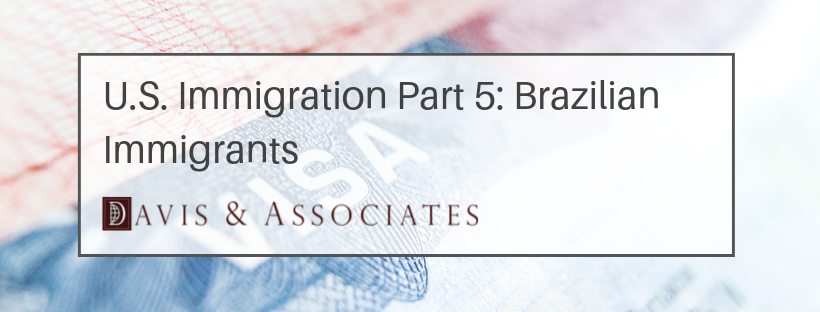
U.S. Immigration Policy & President Trump Part 5: Facts About Brazilian Immigrants in the U.S.
In this blog, we clarify some of the misconceptions about Brazilian immigrants in the U.S. by reviewing some of the facts and statistics that have been reported by the Migration Policy Institute:
- There are approximately 450,000 Brazilian immigrants living in the U.S.
- Brazilians make up 1% of the immigrant population in the U.S.
- Approximately 3,000 Brazilian immigrants are apprehended at Mexico’s border each year.
- States with the highest Brazilian immigrant populations include: Florida (80,000), Massachusetts (65,000), California (39,000), New Jersey (29,000) and New York (25,000).
- Boston (51,000), New York (48,000), and Miami (47,000) have the largest number of Brazilian immigrants.
- Roughly 58% of Brazilian immigrants in the United States are proficient in English or speak only English at home.
- The median age of Brazilian immigrants in 2017 was 39 years old.
- 7% of Brazilians living in the U.S are working-age adults.
- 42% of Brazilian immigrants have at least a four-year college degree.
- 11% of Brazilian immigrants have less than a high school diploma.
- The median household income of Brazilian immigrants ($61,700) was higher overall than other foreign-born populations ($56,700).
- Two-thirds of Brazilian immigrants living in the U.S. arrived after 2000.
- Fewer than 10,000 Brazilian immigrants became naturalized citizens in 2017.
- Fewer than 15,000 Brazilian immigrants were granted legal permanent resident status.
- Employment-based and family-based visas were the most common way Brazilians adjusted their legal permanent resident status.
Follow along in our 5-part series on U.S. immigration policy and President Trump:
Part 1: Major Immigration Changes Under Trump
Part 2: Enhanced Immigration Enforcement
Part 3: Civil Rights Groups Fight for Immigrant Medical Relief Program
Part 4: House Democrat’s Bill Would Ensure Citizenship for Children of Service
At Davis & Associates, we are here to assist with all of your immigration matters. If you have questions about immigration law, give us a call at (214) 999-1942 to request your free case consultation.
